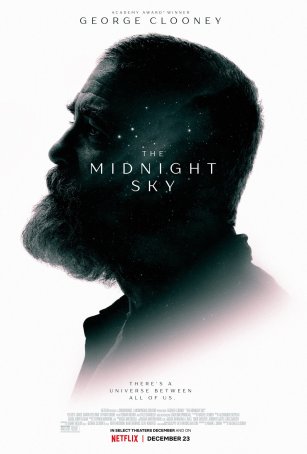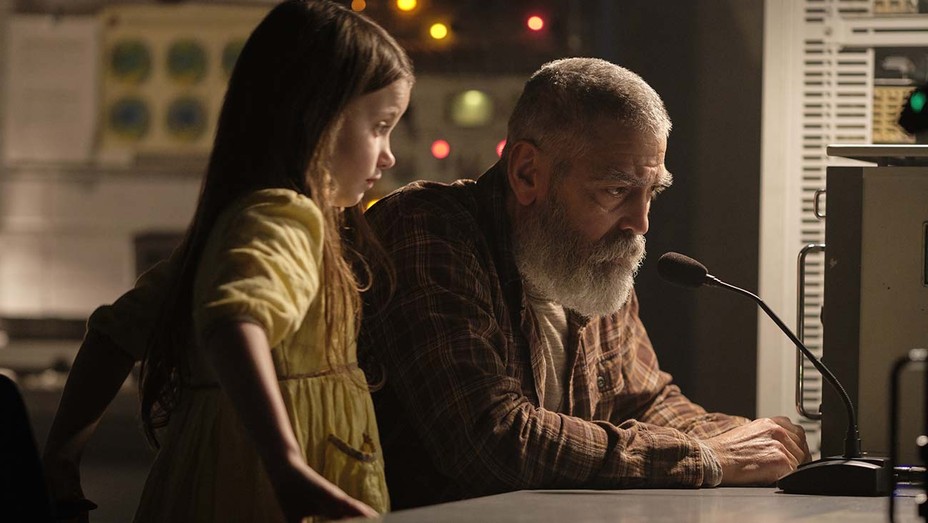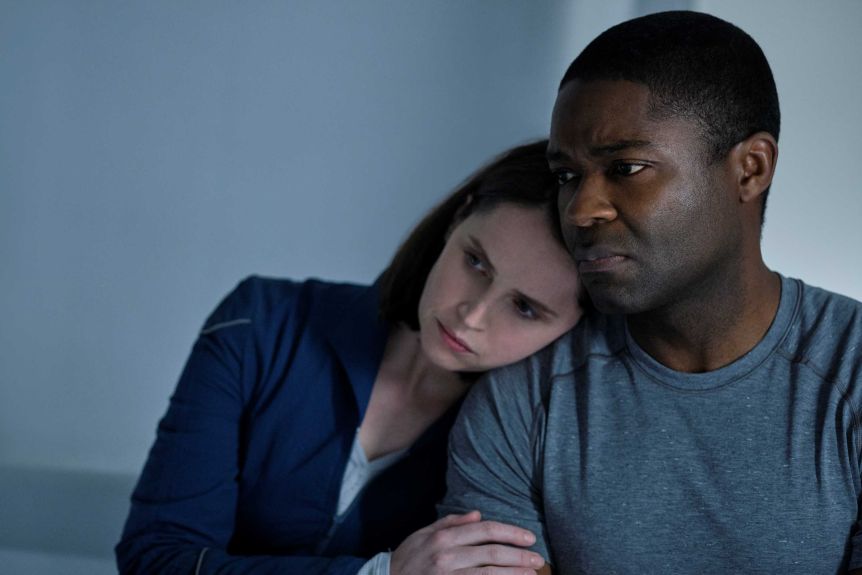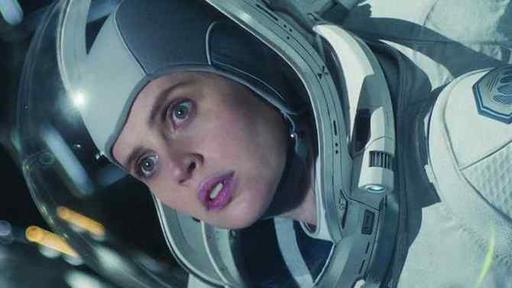Midnight Sky, The (United States, 2020)
December 21, 2020
It’s difficult to express how refreshing it is to encounter a dystopian film that hasn’t been developed for the YA market. Although flavored at times by its twin inspirations Gravity and The Revenant, The Midnight Sky maintains its own unique identity by exploring how people at an endpoint ponder both choices made and roads not taken. The film’s tone is elegiac without being depressing. There is a note of hope, a scintilla of light, but the movie doesn’t give in to the temptation to cop out with a happy ending. The Midnight Sky concludes with the right mix of catharsis and ambiguity.
The biggest task faced by director George Clooney is balancing two seemingly unrelated stories until they dovetail – something that doesn’t happen until well into the film (and, when it does, it’s only a fleeting connection). Pacing is occasionally a minor issue with the action sequences seemingly designed to inject an element of adrenaline into a what is otherwise a character-based story built on an existential foundation. Nevertheless, Clooney keeps things moving and creates interest of varying degrees in both stories.
 As with many dystopian/post-apocalyptic films, the backstory
is murky. (I can’t say whether the decision not to describe the nature of the catastrophe
is a choice made by the filmmakers or a result of this not being revealed in
Lily Brooks-Dalton’s source novel, Good Morning, Midnight.) Something unspecified
has devastated the Earth, rendering it uninhabitable. Small pockets of humans
are still alive but their prospects are dim. Meanwhile, out in the solar
system, an exploratory craft has visited a “promising” new moon of Jupiter and
found it capable of sustaining life. But this discovery apparently comes too
late to save the billions of inhabitants of Earth.
As with many dystopian/post-apocalyptic films, the backstory
is murky. (I can’t say whether the decision not to describe the nature of the catastrophe
is a choice made by the filmmakers or a result of this not being revealed in
Lily Brooks-Dalton’s source novel, Good Morning, Midnight.) Something unspecified
has devastated the Earth, rendering it uninhabitable. Small pockets of humans
are still alive but their prospects are dim. Meanwhile, out in the solar
system, an exploratory craft has visited a “promising” new moon of Jupiter and
found it capable of sustaining life. But this discovery apparently comes too
late to save the billions of inhabitants of Earth.
The Midnight Sky moves seamlessly between the story of Augustine Lofthouse (George Clooney), a scientist working at an Arctic observatory, and the crew of the spacecraft Aether, which is on its return journey from Jupiter. On board are five individuals: Commander Adewole (David Oyelowo) and his partner and communications officer, Sully (Felicity Jones), and crew members Mitchell (Kyle Chandler), Sanchez (Demian Bichir), and Maya (Tiffany Boone). Complicating matters is Sully’s pregnancy; all decisions made by the men and women aboard the Aether must take this into account.
 Gravely ill from terminal cancer, Augustine has elected to
face the end alone, refusing to accompany the other inhabitants of the base
when they evacuate. The flight to safety is chaotic, however, and a six-year-old
girl, Iris (Caoilinn Springall), is left behind. Augustine decides to do what
he can for her in the time he has left, while at the same time seeking to
contact the Aether with a warning about the situation that awaits them
upon their return.
Gravely ill from terminal cancer, Augustine has elected to
face the end alone, refusing to accompany the other inhabitants of the base
when they evacuate. The flight to safety is chaotic, however, and a six-year-old
girl, Iris (Caoilinn Springall), is left behind. Augustine decides to do what
he can for her in the time he has left, while at the same time seeking to
contact the Aether with a warning about the situation that awaits them
upon their return.
Clooney’s two biggest influences are obvious. The space-based scenes, which include an outside walk on the Aether to repair damage done by a meteor storm, illustrate how well the actor/director learned from Alfonso Cuaron when the two collaborated on Gravity. It would be unfair, however, to label The Midnight Sky as “Gravity light.” And, while screenwriter Mark L. Smith co-wrote The Revenant, echoes are limited to the artic trek endured by Augustine as circumstances force him to travel to a second observatory.
 Clooney’s dedication to his craft is well-known within
Hollywood circles but it has perhaps never been more evident than in The
Midnight Sky. The physical transformation, although not Christian Bale-like
in its extremism, is striking. Although only 59, Clooney appears somewhere between
10 and 20 years older than that and his famously handsome features are gaunt
and sunken. As a result of undergoing a crash diet to lose 30 pounds, he was
hospitalized with pancreatitis. To achieve realism, he insisted that a critical
scene be filmed in believable conditions, resulting in a degree of deprivation
that even James Cameron might not impose. It all works. Not only is Clooney at
his melancholy best but he culls strong performances from the rest of the cast,
including two Oscar nominees (Felicity Jones, Demian Bichir) and a stunning
newcomer (Caoilinn Springall). Springall’s work is notable in particular since
it involves only facial expressions and body language. It’s remarkable for an
actress to be so accomplished at such a young age. (She was seven years old
during filming.)
Clooney’s dedication to his craft is well-known within
Hollywood circles but it has perhaps never been more evident than in The
Midnight Sky. The physical transformation, although not Christian Bale-like
in its extremism, is striking. Although only 59, Clooney appears somewhere between
10 and 20 years older than that and his famously handsome features are gaunt
and sunken. As a result of undergoing a crash diet to lose 30 pounds, he was
hospitalized with pancreatitis. To achieve realism, he insisted that a critical
scene be filmed in believable conditions, resulting in a degree of deprivation
that even James Cameron might not impose. It all works. Not only is Clooney at
his melancholy best but he culls strong performances from the rest of the cast,
including two Oscar nominees (Felicity Jones, Demian Bichir) and a stunning
newcomer (Caoilinn Springall). Springall’s work is notable in particular since
it involves only facial expressions and body language. It’s remarkable for an
actress to be so accomplished at such a young age. (She was seven years old
during filming.)
I sometimes complain that disaster/post-apocalyptic movies ignore the human toll of the situation in favor of flashy special effects and action sequences. In The Midnight Sky, Clooney doesn’t skimp on the technical elements but this is about the individuals caught up in the circumstances. They’re normal people grappling with unthinkable realities and facing challenges where the word “daunting” would be an understatement. The hiccups resulting from the back-and-forth switches between two disconnected stories are no more than a minor irritant when one considers the wider scope. In making this film, Clooney has accomplished something rare and unusual in today’s cinema – an epic science fiction motion picture that focuses on characters and ideas.
Midnight Sky, The (United States, 2020)
Cast: George Clooney, Felicity Jones, David Oyelowo, Tiffany Boone, Demian Bichir, Kyle Chandler, Caoilinn Springall
Screenplay: Mark L. Smith, based on the book “Good Morning, Midnight” by Lily Brooks-Dalton
Cinematography: Martin Ruhe
Music: Alexandre Desplat
U.S. Distributor: Netflix
U.S. Release Date: 2020-12-23
MPAA Rating: "PG-13" (Adult Themes, Profanity)
Genre: Science Fiction
Subtitles: none
Theatrical Aspect Ratio: 2.11:1
Comments